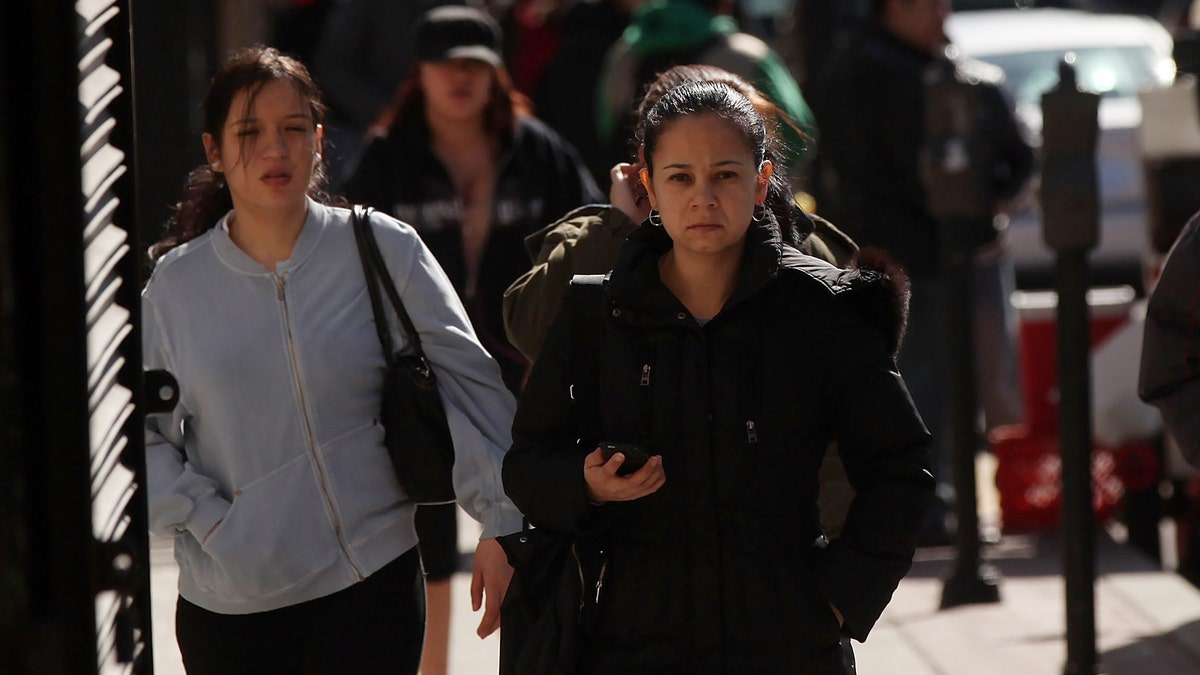
UNION CITY, NJ - MARCH 28: Hispanic residents walk down a street on March 28, 2011 in Union City, New Jersey. Union City New Jersey, one of the stateâs largest cities, has a population of Hispanic or Latino origin of over 80%. According to the new 2010 Census Bureau statistics reported last Thursday, the Hispanic population in the United States has grown by 43% in the last decade, surpassing 50 million and accounting for about 1 out of 6 Americans. (Photo by Spencer Platt/Getty Images) (2011 Getty Images)
Now that the immigration debate has shifted from the U.S. Senate to the House of Representatives, we should expect every Congressman to do their elected duty and work toward finding the common ground needed to confront our national immigration problem now.
While there are many people and vested interests on both ends of the political spectrum that would much rather see the status quo remain, the reality is that a continuation of today’s state of affairs only exacerbates the myriad of immigration problems we face.
The Senate’s proposal threatens to not only undo what we have accomplished, but redirect that talent and energy elsewhere.
Not only would we continue with de facto amnesty, but the border will go unsecured and, to put it bluntly, the countless industries requiring everything from manual to highly-skilled labor will simply not be able to hire the manpower they need.
These problems will not get better. In fact, they will only grow worse. That is bad news for our lawmakers in Washington. But that’s even worse news for our economy. McKinsey & Co estimates that by 2020, an estimated 1.5 million jobs will go unfilled in the United States. To accomplish real change, we need to think about immigration reform not in terms of social justice - but in terms of our economic security. Reform means jobs, it means growth and it means sustaining our competitive advantage in a global economy.
The Senate’s bill dealt with some important issues. Among other promising elements, it doubles the number of H-1B visas made available each year to highly-skilled immigrants. Those that supported this reform in the Senate should be commended for this. But there are other provisions that concern me deeply because they would impact our economy in the most basic and damaging terms.
The United States, with all the economic challenges we currently face, is not graduating the number of engineers, math and science students our economy requires. To make matters worse, a significant portion of those that graduate at U.S. universities are international students, many of whom would likely stay to work here for American companies if they had a visa attached to their diploma. But, because we don’t give them one, they go to work in competing economies, whether in Asia, Europe, Latin America or even Canada.
The Senate’s legislation would also place arbitrary limits the number of visas an American company can secure, capping its potential for growth, and prohibit the companies best able to attract skilled international talent from providing high tech consulting services at their client sites.
The Senate understands that we have an H-1B problem. If we need a solution, our neighbors to the north are recruiting. The main highway connecting San Francisco to Silicon Valley boasts a billboard recruiting our best and brightest, with promises of easy visa accessibility, high-paying jobs and low taxes. Canada is not alone, with Australia, Britain and Chile offering some of the same inducements. Referencing the ad’s strategic placement, Canadian Immigration Minister Jason T. Kenney calls the Bay Area’s talented commuters “a captive audience.”
The most fundamental component of a capitalistic world is human capital. And the United States established its commanding presence in the global 21st century economy by mastering the potential of the human economy.
The Senate’s proposal threatens to not only undo what we have accomplished, but redirect that talent and energy elsewhere.
I have said for a long time that this is a very difficult problem because if it was an easy problem to solve we would have found the solution long time ago. President Reagan signed the Immigration Reform act in 1986 and since then, the problem that he thought he fixed has grown exponentially.
With only so many days left on the Congressional calendar, there is little time this year to accomplish any major legislative achievements. With the clock ticking, all eyes are now on the House of Representatives. We need to fix immigration now and we need to do it right.







































